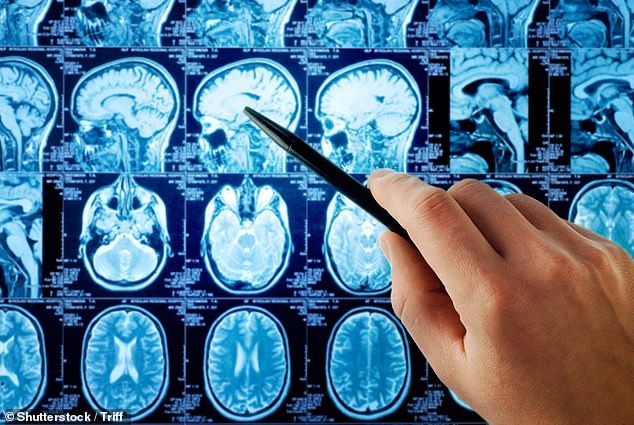Artificial intelligence has been employed in the fight against dementia by scientists who say it can diagnose the condition from a single scan of the brain.
Currently in pre-clinical trials, the system has been able to diagnose dementia years before the first symptoms develop, even with no signs of damage on the scan.
It currently takes multiple scans and tests to diagnose dementia, and by the time they are complete it may be too late to enact some of the remedies that can offset the condition, researchers from the Alan Turing Institute in Cambridge explained.
The new system compares brain scans of those worried they might have dementia with scans from thousands of dementia patients to identify patterns.
Being able to diagnose the condition early, even before any signs are visible on scans, will allow for lifestyle and medical interventions to delay the onset, according to the team.

Artificial intelligence has been employed in the fight against dementia by scientists who say it can diagnose the condition from a single scan of the brain. Stock image
HOW TO DETECT ALZHEIMER’S
Signs and symptoms:
Difficulty remembering newly learned informationDisorientationMood and behavioural changesSuspicion about family, friends and professional caregiversMore serious memory lossDifficulty with speaking, swallowing and walking
Stages of Alzheimer’s:
Mild Alzheimer’s (early-stage) – A person may be able to function independently but is having memory lapsesModerate Alzheimer’s (middle-stage) – Typically the longest stage, the person may confuse words, get frustrated or angry, or have sudden behavioural changesSevere Alzheimer’s disease (late-stage) – In the final stage, individuals lose the ability to respond to their environment, carry on a conversation and, eventually, control movementAdvertisement
To find out how effective the new system is on actual patients, a trial of about 500 people suspected to have the condition or at fear of developing it will be carried out at Addenbrooke’s Hospital in Cambridge and other memory clinics in the UK.
Zoe Kourtzi, professor of cognitive computational neuroscience at the Alan Turing Institute and professor of experimental psychology at the University of Cambridge, said results from individuals in the study will be sent to their doctors if necessary.
She told the BBC: ‘If we intervene early, the treatments can kick in early and slow down the progression of the disease and at the same time avoid more damage.
‘And it’s likely that symptoms occur much later in life or may never occur.’
Consultant neurologist Dr Timothy Rittman, from the University of Cambridge, told the BBC the artificial-intelligence system was a ‘fantastic development’.
He said: ‘These set of diseases are really devastating for people,’ adding that when delivering information to a patient being confident in the diagnosis is important.
It is important to ‘give them more information about the likely progression of the disease to help them plan their lives,’ he said.
More than 850,000 people in the UK are thought to have dementia, according to the NHS, with the condition affecting one in 14 people over the age of 65, and one in six people aged over 80.
Mark Thompson, 57, a patient of Dr Rittman, started having memory lapses nearly a year ago and said early intervention would have made a big difference to him.
‘I had test after test after test and at least four scans before I was diagnosed,’ he told the BBC, adding the team did everything they could to understand his issues.
Alzheimer’s Research UK has said predictions from 2014 estimated that one million people here will have dementia by 2025, doubling to two million by 2050.
Dr Laura Phipps, from the charity, said this work will help doctors have more confidence in scans when making a diagnosis of dementia in the future.
‘To diagnose dementia today, doctors need to rely on the interpretation of brain scans and cognitive tests, often over a period of time,’ she explained.

To find out how effective the new system is on actual patients, a trial of about 500 people suspected to have the condition or at fear of developing it will be carried out at Addenbrooke’s Hospital in Cambridge and other memory clinics in the UK. Stock image
‘Machine learning models such as those being developed by Prof Kourtzi could give doctors greater confidence in interpreting scans, leading to a more accurate diagnosis for patients.’
‘It is hope that in the future these approaches will not only improve how current diagnostic techniques are implemented but open the door to revolutionary new approaches to detect the diseases that cause dementia much earlier.
‘This would have a huge impact on people with dementia and their families.’
She said Prof Kourtzi is also leading a project funded by Alzheimer’s Research UK looking at data on fine motor skills, sleep, cognition and brain activity from a range of sources to predict Alzheimer’s up to 20 years earlier than is possible now.
WHAT IS DEMENTIA? THE KILLER DISEASE THAT ROBS SUFFERERS OF THEIR MEMORIES 
Dementia is an umbrella term used to describe a range of neurological disorders
A GLOBAL CONCERN
Dementia is an umbrella term used to describe a range of progressive neurological disorders (those affecting the brain) which impact memory, thinking and behaviour.
There are many different types of dementia, of which Alzheimer’s disease is the most common.
Some people may have a combination of types of dementia.
Regardless of which type is diagnosed, each person will experience their dementia in their own unique way.
Dementia is a global concern but it is most often seen in wealthier countries, where people are likely to live into very old age.
HOW MANY PEOPLE ARE AFFECTED?
The Alzheimer’s Society reports there are more than 850,000 people living with dementia in the UK today, of which more than 500,000 have Alzheimer’s.
It is estimated that the number of people living with dementia in the UK by 2025 will rise to over 1 million.
In the US, it’s estimated there are 5.5 million Alzheimer’s sufferers. A similar percentage rise is expected in the coming years.
As a person’s age increases, so does the risk of them developing dementia.
Rates of diagnosis are improving but many people with dementia are thought to still be undiagnosed.
IS THERE A CURE?
Currently there is no cure for dementia.
But new drugs can slow down its progression and the earlier it is spotted the more effective treatments are.
Source: Alzheimer’s Society
Advertisement
Source link : https://www.dailymail.co.uk/sciencetech/article-9879507/Scientists-develop-AI-diagnose-dementia-single-brain-scan.html











